Law Assessment: Separate Legal Personality and Corporate Veil Analysis
VerifiedAdded on 2021/01/01
|11
|3487
|225
Report
AI Summary
This law assessment critically analyzes the development of the legal concept of separate legal personality of a business, examining its foundational principles and evolution through landmark cases such as Solomon v Solomon. The report details the rules governing separate legal personality, where a company is recognized as a distinct legal entity from its members, possessing its own rights, duties, and liabilities. It explores the concept of the corporate veil and the circumstances under which it can be pierced, including agency and single economic entity principles. The assessment covers relevant legislation, including sections from the Companies Act 2014 of Ireland, and analyzes key case laws such as DHN Food Distributors Ltd v Tower Hamlet Borough Council, Power Supermarkets v Crumlin Investments & ors, and Allied Irish Coal Supplies Ltd. v Powell Duffryn International Fuels Ltd. The application section discusses the relevance of these laws in business operations and contrasts the approaches of Irish and UK courts, highlighting the differing views on piercing the corporate veil and treating related companies as a single economic entity.
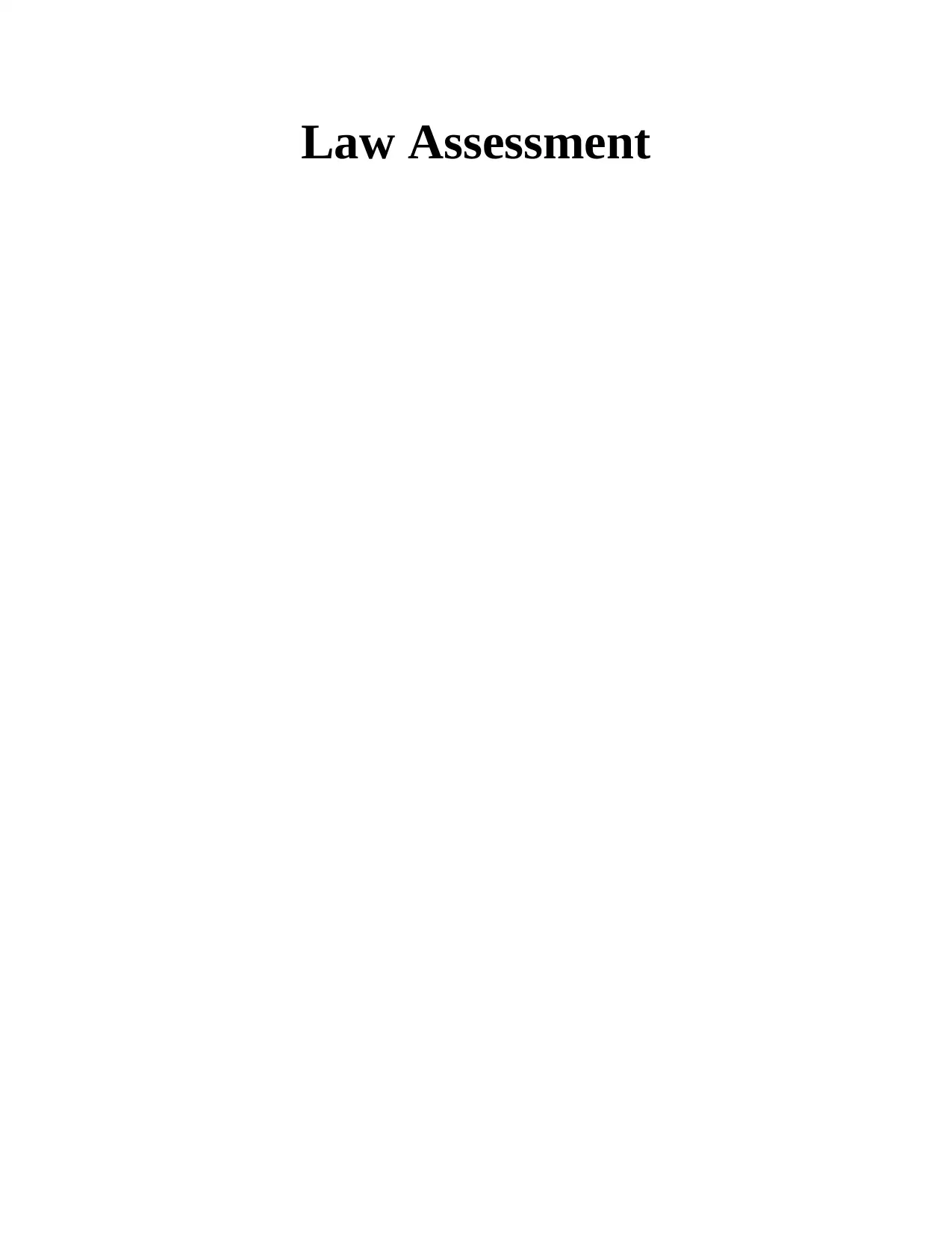
Law Assessment
Paraphrase This Document
Need a fresh take? Get an instant paraphrase of this document with our AI Paraphraser
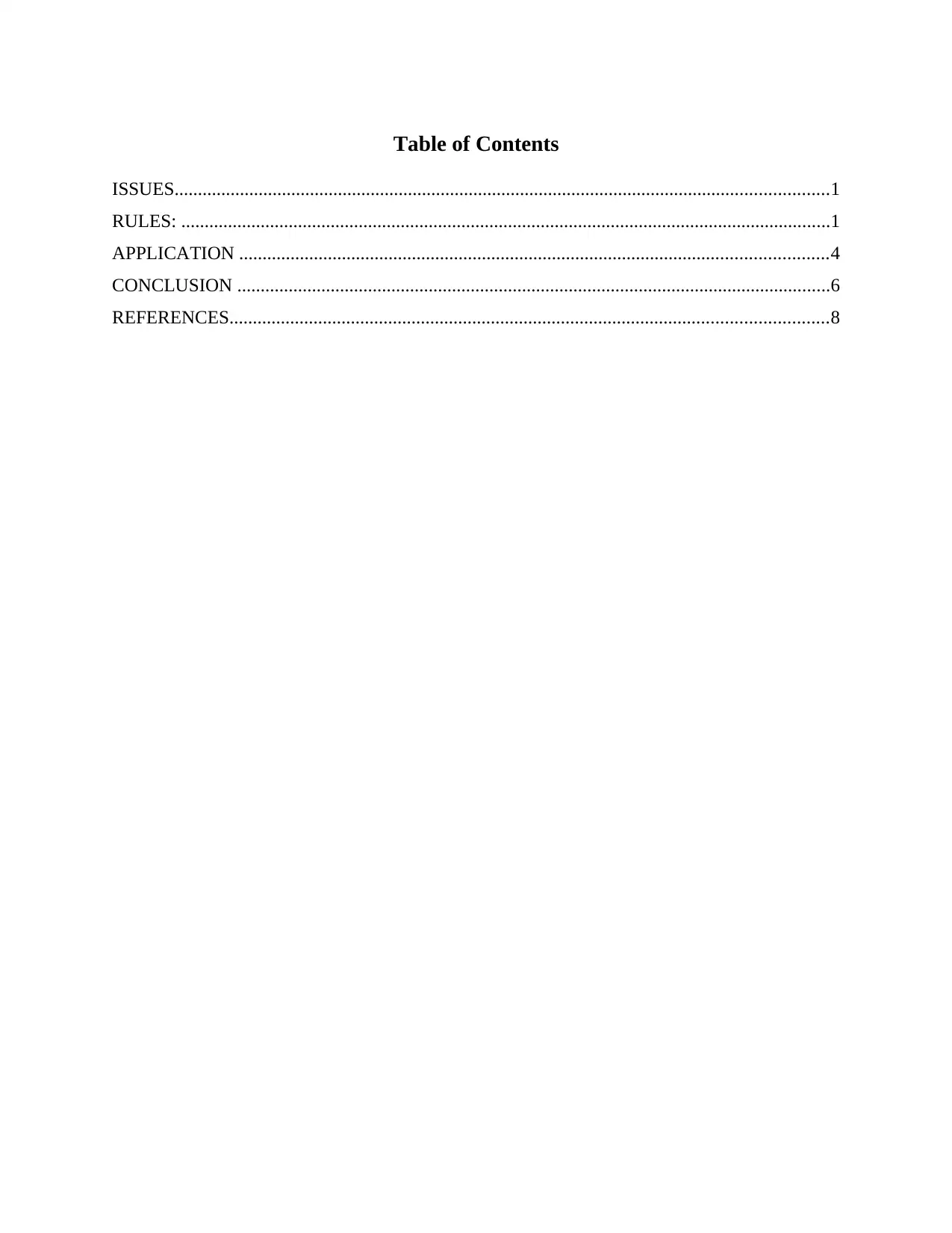
Table of Contents
ISSUES............................................................................................................................................1
RULES: ...........................................................................................................................................1
APPLICATION ..............................................................................................................................4
CONCLUSION ...............................................................................................................................6
REFERENCES................................................................................................................................8
ISSUES............................................................................................................................................1
RULES: ...........................................................................................................................................1
APPLICATION ..............................................................................................................................4
CONCLUSION ...............................................................................................................................6
REFERENCES................................................................................................................................8
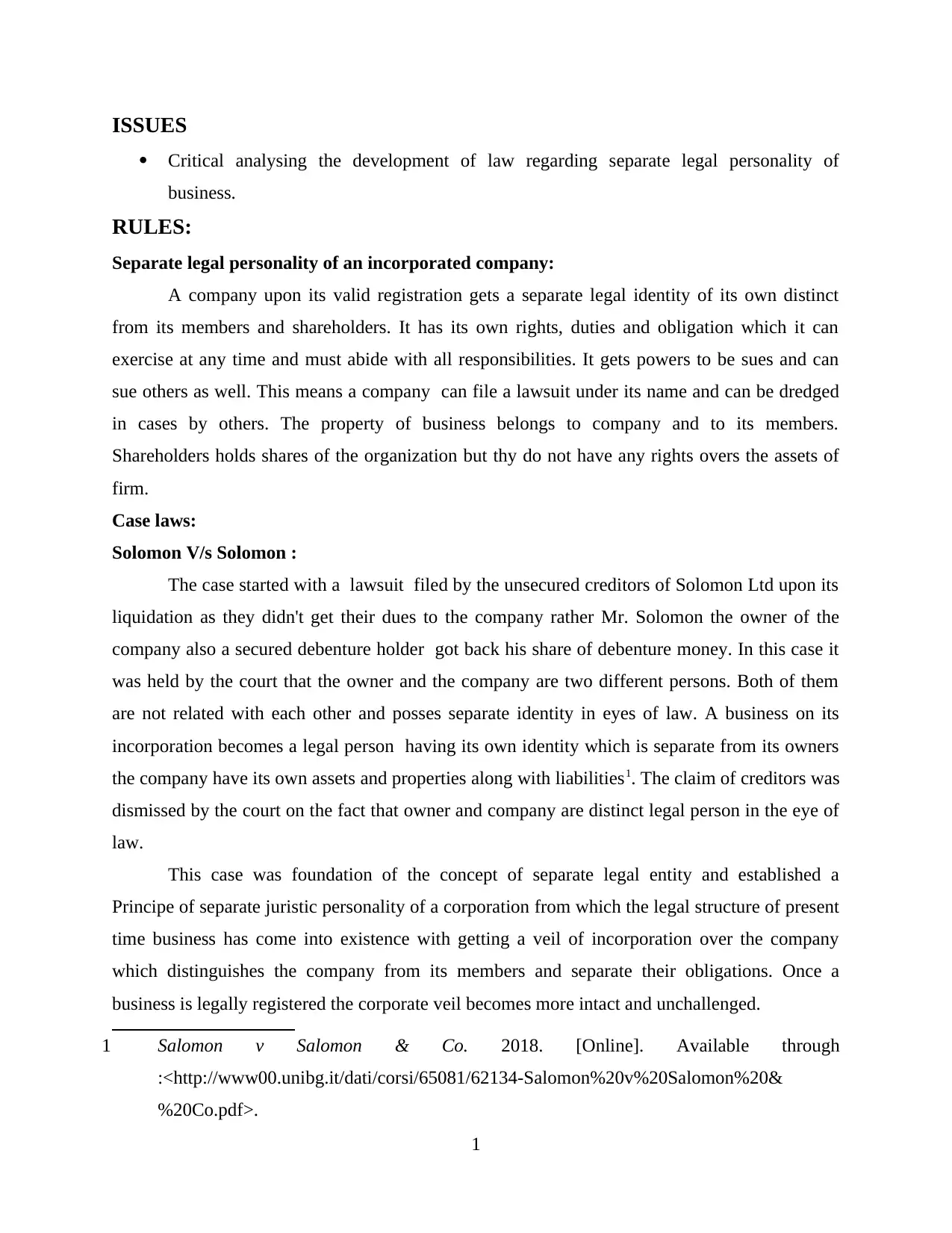
ISSUES
Critical analysing the development of law regarding separate legal personality of
business.
RULES:
Separate legal personality of an incorporated company:
A company upon its valid registration gets a separate legal identity of its own distinct
from its members and shareholders. It has its own rights, duties and obligation which it can
exercise at any time and must abide with all responsibilities. It gets powers to be sues and can
sue others as well. This means a company can file a lawsuit under its name and can be dredged
in cases by others. The property of business belongs to company and to its members.
Shareholders holds shares of the organization but thy do not have any rights overs the assets of
firm.
Case laws:
Solomon V/s Solomon :
The case started with a lawsuit filed by the unsecured creditors of Solomon Ltd upon its
liquidation as they didn't get their dues to the company rather Mr. Solomon the owner of the
company also a secured debenture holder got back his share of debenture money. In this case it
was held by the court that the owner and the company are two different persons. Both of them
are not related with each other and posses separate identity in eyes of law. A business on its
incorporation becomes a legal person having its own identity which is separate from its owners
the company have its own assets and properties along with liabilities1. The claim of creditors was
dismissed by the court on the fact that owner and company are distinct legal person in the eye of
law.
This case was foundation of the concept of separate legal entity and established a
Principe of separate juristic personality of a corporation from which the legal structure of present
time business has come into existence with getting a veil of incorporation over the company
which distinguishes the company from its members and separate their obligations. Once a
business is legally registered the corporate veil becomes more intact and unchallenged.
1 Salomon v Salomon & Co. 2018. [Online]. Available through
:<http://www00.unibg.it/dati/corsi/65081/62134-Salomon%20v%20Salomon%20&
%20Co.pdf>.
1
Critical analysing the development of law regarding separate legal personality of
business.
RULES:
Separate legal personality of an incorporated company:
A company upon its valid registration gets a separate legal identity of its own distinct
from its members and shareholders. It has its own rights, duties and obligation which it can
exercise at any time and must abide with all responsibilities. It gets powers to be sues and can
sue others as well. This means a company can file a lawsuit under its name and can be dredged
in cases by others. The property of business belongs to company and to its members.
Shareholders holds shares of the organization but thy do not have any rights overs the assets of
firm.
Case laws:
Solomon V/s Solomon :
The case started with a lawsuit filed by the unsecured creditors of Solomon Ltd upon its
liquidation as they didn't get their dues to the company rather Mr. Solomon the owner of the
company also a secured debenture holder got back his share of debenture money. In this case it
was held by the court that the owner and the company are two different persons. Both of them
are not related with each other and posses separate identity in eyes of law. A business on its
incorporation becomes a legal person having its own identity which is separate from its owners
the company have its own assets and properties along with liabilities1. The claim of creditors was
dismissed by the court on the fact that owner and company are distinct legal person in the eye of
law.
This case was foundation of the concept of separate legal entity and established a
Principe of separate juristic personality of a corporation from which the legal structure of present
time business has come into existence with getting a veil of incorporation over the company
which distinguishes the company from its members and separate their obligations. Once a
business is legally registered the corporate veil becomes more intact and unchallenged.
1 Salomon v Salomon & Co. 2018. [Online]. Available through
:<http://www00.unibg.it/dati/corsi/65081/62134-Salomon%20v%20Salomon%20&
%20Co.pdf>.
1
⊘ This is a preview!⊘
Do you want full access?
Subscribe today to unlock all pages.

Trusted by 1+ million students worldwide
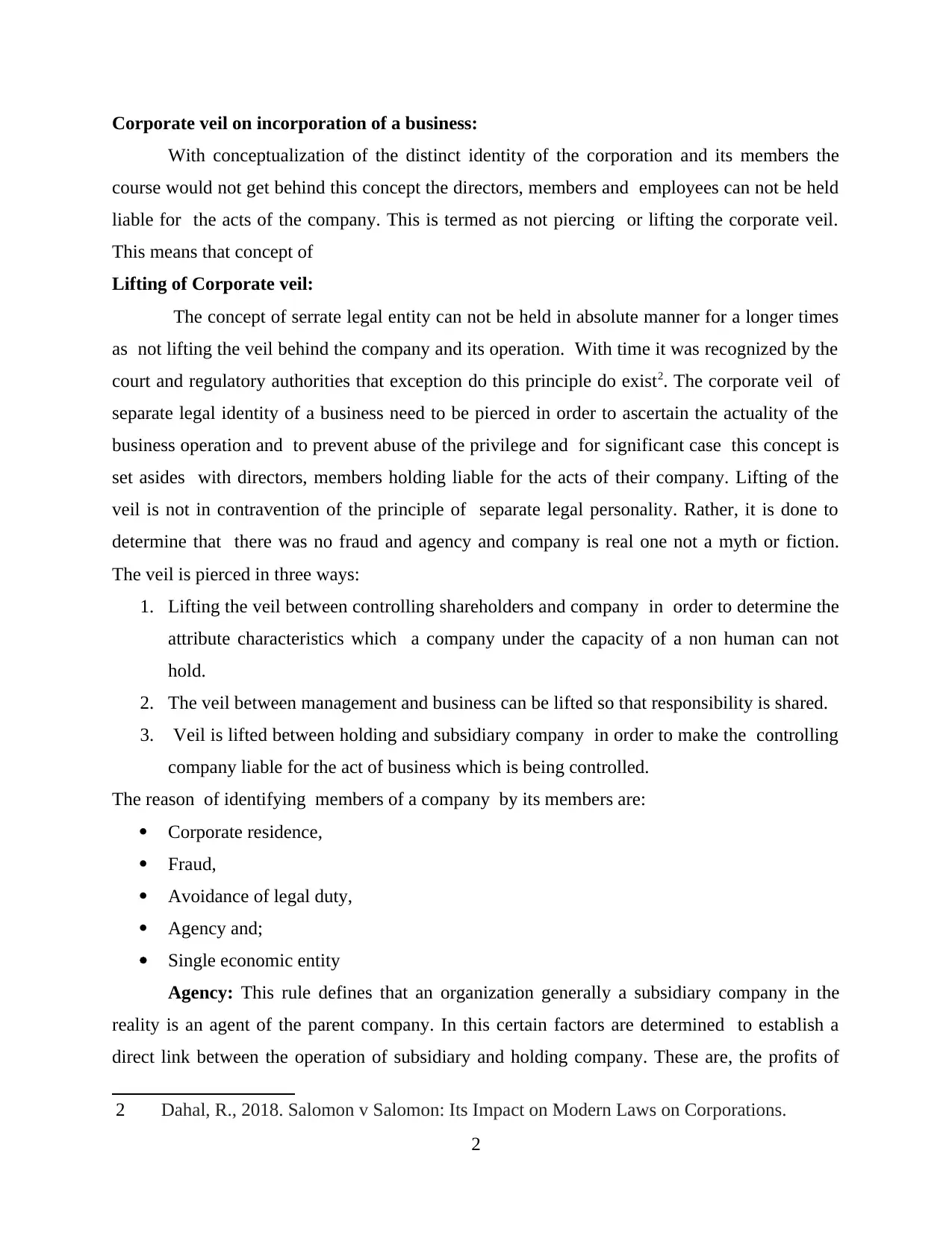
Corporate veil on incorporation of a business:
With conceptualization of the distinct identity of the corporation and its members the
course would not get behind this concept the directors, members and employees can not be held
liable for the acts of the company. This is termed as not piercing or lifting the corporate veil.
This means that concept of
Lifting of Corporate veil:
The concept of serrate legal entity can not be held in absolute manner for a longer times
as not lifting the veil behind the company and its operation. With time it was recognized by the
court and regulatory authorities that exception do this principle do exist2. The corporate veil of
separate legal identity of a business need to be pierced in order to ascertain the actuality of the
business operation and to prevent abuse of the privilege and for significant case this concept is
set asides with directors, members holding liable for the acts of their company. Lifting of the
veil is not in contravention of the principle of separate legal personality. Rather, it is done to
determine that there was no fraud and agency and company is real one not a myth or fiction.
The veil is pierced in three ways:
1. Lifting the veil between controlling shareholders and company in order to determine the
attribute characteristics which a company under the capacity of a non human can not
hold.
2. The veil between management and business can be lifted so that responsibility is shared.
3. Veil is lifted between holding and subsidiary company in order to make the controlling
company liable for the act of business which is being controlled.
The reason of identifying members of a company by its members are:
Corporate residence,
Fraud,
Avoidance of legal duty,
Agency and;
Single economic entity
Agency: This rule defines that an organization generally a subsidiary company in the
reality is an agent of the parent company. In this certain factors are determined to establish a
direct link between the operation of subsidiary and holding company. These are, the profits of
2 Dahal, R., 2018. Salomon v Salomon: Its Impact on Modern Laws on Corporations.
2
With conceptualization of the distinct identity of the corporation and its members the
course would not get behind this concept the directors, members and employees can not be held
liable for the acts of the company. This is termed as not piercing or lifting the corporate veil.
This means that concept of
Lifting of Corporate veil:
The concept of serrate legal entity can not be held in absolute manner for a longer times
as not lifting the veil behind the company and its operation. With time it was recognized by the
court and regulatory authorities that exception do this principle do exist2. The corporate veil of
separate legal identity of a business need to be pierced in order to ascertain the actuality of the
business operation and to prevent abuse of the privilege and for significant case this concept is
set asides with directors, members holding liable for the acts of their company. Lifting of the
veil is not in contravention of the principle of separate legal personality. Rather, it is done to
determine that there was no fraud and agency and company is real one not a myth or fiction.
The veil is pierced in three ways:
1. Lifting the veil between controlling shareholders and company in order to determine the
attribute characteristics which a company under the capacity of a non human can not
hold.
2. The veil between management and business can be lifted so that responsibility is shared.
3. Veil is lifted between holding and subsidiary company in order to make the controlling
company liable for the act of business which is being controlled.
The reason of identifying members of a company by its members are:
Corporate residence,
Fraud,
Avoidance of legal duty,
Agency and;
Single economic entity
Agency: This rule defines that an organization generally a subsidiary company in the
reality is an agent of the parent company. In this certain factors are determined to establish a
direct link between the operation of subsidiary and holding company. These are, the profits of
2 Dahal, R., 2018. Salomon v Salomon: Its Impact on Modern Laws on Corporations.
2
Paraphrase This Document
Need a fresh take? Get an instant paraphrase of this document with our AI Paraphraser
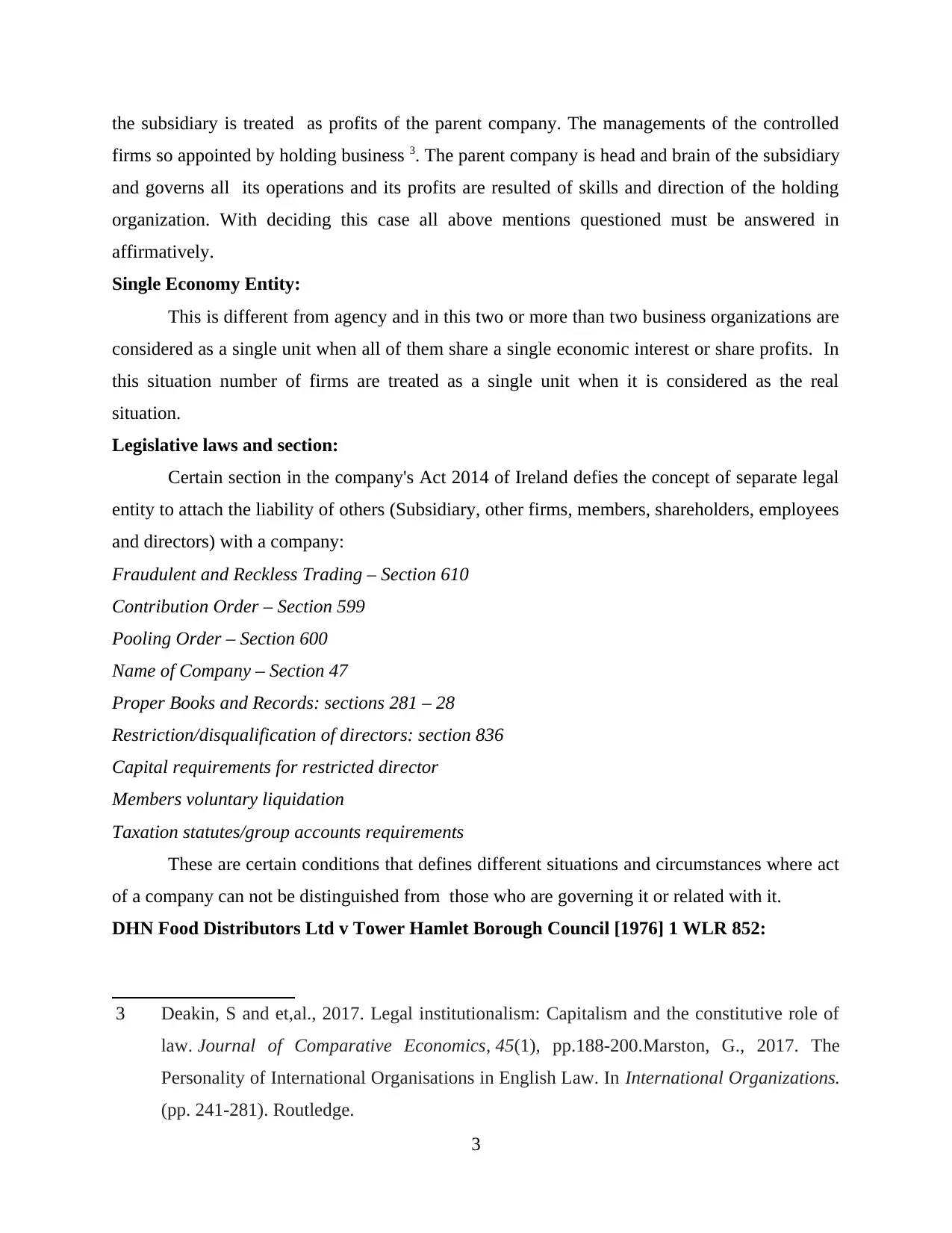
the subsidiary is treated as profits of the parent company. The managements of the controlled
firms so appointed by holding business 3. The parent company is head and brain of the subsidiary
and governs all its operations and its profits are resulted of skills and direction of the holding
organization. With deciding this case all above mentions questioned must be answered in
affirmatively.
Single Economy Entity:
This is different from agency and in this two or more than two business organizations are
considered as a single unit when all of them share a single economic interest or share profits. In
this situation number of firms are treated as a single unit when it is considered as the real
situation.
Legislative laws and section:
Certain section in the company's Act 2014 of Ireland defies the concept of separate legal
entity to attach the liability of others (Subsidiary, other firms, members, shareholders, employees
and directors) with a company:
Fraudulent and Reckless Trading – Section 610
Contribution Order – Section 599
Pooling Order – Section 600
Name of Company – Section 47
Proper Books and Records: sections 281 – 28
Restriction/disqualification of directors: section 836
Capital requirements for restricted director
Members voluntary liquidation
Taxation statutes/group accounts requirements
These are certain conditions that defines different situations and circumstances where act
of a company can not be distinguished from those who are governing it or related with it.
DHN Food Distributors Ltd v Tower Hamlet Borough Council [1976] 1 WLR 852:
3 Deakin, S and et,al., 2017. Legal institutionalism: Capitalism and the constitutive role of
law. Journal of Comparative Economics, 45(1), pp.188-200.Marston, G., 2017. The
Personality of International Organisations in English Law. In International Organizations.
(pp. 241-281). Routledge.
3
firms so appointed by holding business 3. The parent company is head and brain of the subsidiary
and governs all its operations and its profits are resulted of skills and direction of the holding
organization. With deciding this case all above mentions questioned must be answered in
affirmatively.
Single Economy Entity:
This is different from agency and in this two or more than two business organizations are
considered as a single unit when all of them share a single economic interest or share profits. In
this situation number of firms are treated as a single unit when it is considered as the real
situation.
Legislative laws and section:
Certain section in the company's Act 2014 of Ireland defies the concept of separate legal
entity to attach the liability of others (Subsidiary, other firms, members, shareholders, employees
and directors) with a company:
Fraudulent and Reckless Trading – Section 610
Contribution Order – Section 599
Pooling Order – Section 600
Name of Company – Section 47
Proper Books and Records: sections 281 – 28
Restriction/disqualification of directors: section 836
Capital requirements for restricted director
Members voluntary liquidation
Taxation statutes/group accounts requirements
These are certain conditions that defines different situations and circumstances where act
of a company can not be distinguished from those who are governing it or related with it.
DHN Food Distributors Ltd v Tower Hamlet Borough Council [1976] 1 WLR 852:
3 Deakin, S and et,al., 2017. Legal institutionalism: Capitalism and the constitutive role of
law. Journal of Comparative Economics, 45(1), pp.188-200.Marston, G., 2017. The
Personality of International Organisations in English Law. In International Organizations.
(pp. 241-281). Routledge.
3
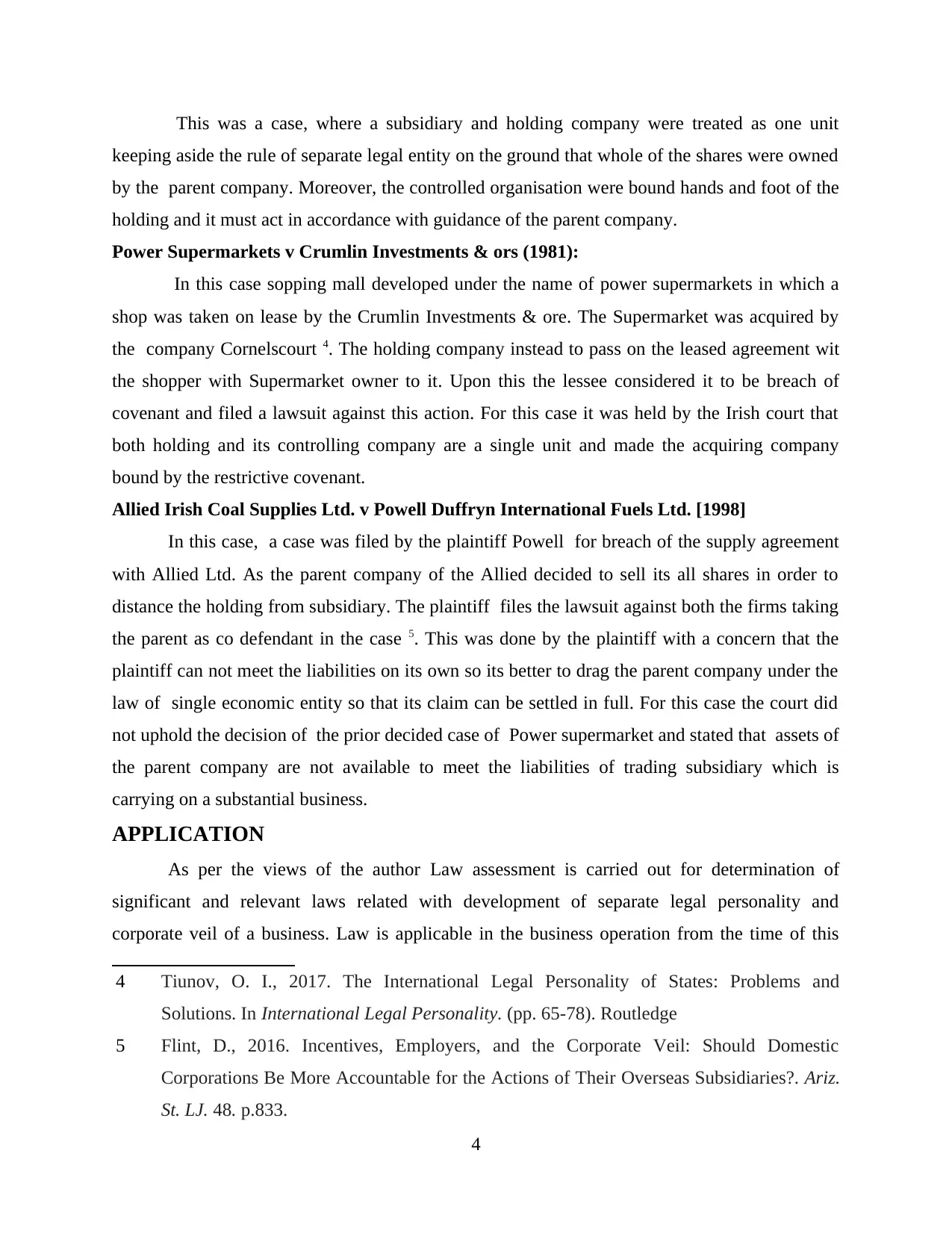
This was a case, where a subsidiary and holding company were treated as one unit
keeping aside the rule of separate legal entity on the ground that whole of the shares were owned
by the parent company. Moreover, the controlled organisation were bound hands and foot of the
holding and it must act in accordance with guidance of the parent company.
Power Supermarkets v Crumlin Investments & ors (1981):
In this case sopping mall developed under the name of power supermarkets in which a
shop was taken on lease by the Crumlin Investments & ore. The Supermarket was acquired by
the company Cornelscourt 4. The holding company instead to pass on the leased agreement wit
the shopper with Supermarket owner to it. Upon this the lessee considered it to be breach of
covenant and filed a lawsuit against this action. For this case it was held by the Irish court that
both holding and its controlling company are a single unit and made the acquiring company
bound by the restrictive covenant.
Allied Irish Coal Supplies Ltd. v Powell Duffryn International Fuels Ltd. [1998]
In this case, a case was filed by the plaintiff Powell for breach of the supply agreement
with Allied Ltd. As the parent company of the Allied decided to sell its all shares in order to
distance the holding from subsidiary. The plaintiff files the lawsuit against both the firms taking
the parent as co defendant in the case 5. This was done by the plaintiff with a concern that the
plaintiff can not meet the liabilities on its own so its better to drag the parent company under the
law of single economic entity so that its claim can be settled in full. For this case the court did
not uphold the decision of the prior decided case of Power supermarket and stated that assets of
the parent company are not available to meet the liabilities of trading subsidiary which is
carrying on a substantial business.
APPLICATION
As per the views of the author Law assessment is carried out for determination of
significant and relevant laws related with development of separate legal personality and
corporate veil of a business. Law is applicable in the business operation from the time of this
4 Tiunov, O. I., 2017. The International Legal Personality of States: Problems and
Solutions. In International Legal Personality. (pp. 65-78). Routledge
5 Flint, D., 2016. Incentives, Employers, and the Corporate Veil: Should Domestic
Corporations Be More Accountable for the Actions of Their Overseas Subsidiaries?. Ariz.
St. LJ. 48. p.833.
4
keeping aside the rule of separate legal entity on the ground that whole of the shares were owned
by the parent company. Moreover, the controlled organisation were bound hands and foot of the
holding and it must act in accordance with guidance of the parent company.
Power Supermarkets v Crumlin Investments & ors (1981):
In this case sopping mall developed under the name of power supermarkets in which a
shop was taken on lease by the Crumlin Investments & ore. The Supermarket was acquired by
the company Cornelscourt 4. The holding company instead to pass on the leased agreement wit
the shopper with Supermarket owner to it. Upon this the lessee considered it to be breach of
covenant and filed a lawsuit against this action. For this case it was held by the Irish court that
both holding and its controlling company are a single unit and made the acquiring company
bound by the restrictive covenant.
Allied Irish Coal Supplies Ltd. v Powell Duffryn International Fuels Ltd. [1998]
In this case, a case was filed by the plaintiff Powell for breach of the supply agreement
with Allied Ltd. As the parent company of the Allied decided to sell its all shares in order to
distance the holding from subsidiary. The plaintiff files the lawsuit against both the firms taking
the parent as co defendant in the case 5. This was done by the plaintiff with a concern that the
plaintiff can not meet the liabilities on its own so its better to drag the parent company under the
law of single economic entity so that its claim can be settled in full. For this case the court did
not uphold the decision of the prior decided case of Power supermarket and stated that assets of
the parent company are not available to meet the liabilities of trading subsidiary which is
carrying on a substantial business.
APPLICATION
As per the views of the author Law assessment is carried out for determination of
significant and relevant laws related with development of separate legal personality and
corporate veil of a business. Law is applicable in the business operation from the time of this
4 Tiunov, O. I., 2017. The International Legal Personality of States: Problems and
Solutions. In International Legal Personality. (pp. 65-78). Routledge
5 Flint, D., 2016. Incentives, Employers, and the Corporate Veil: Should Domestic
Corporations Be More Accountable for the Actions of Their Overseas Subsidiaries?. Ariz.
St. LJ. 48. p.833.
4
⊘ This is a preview!⊘
Do you want full access?
Subscribe today to unlock all pages.

Trusted by 1+ million students worldwide
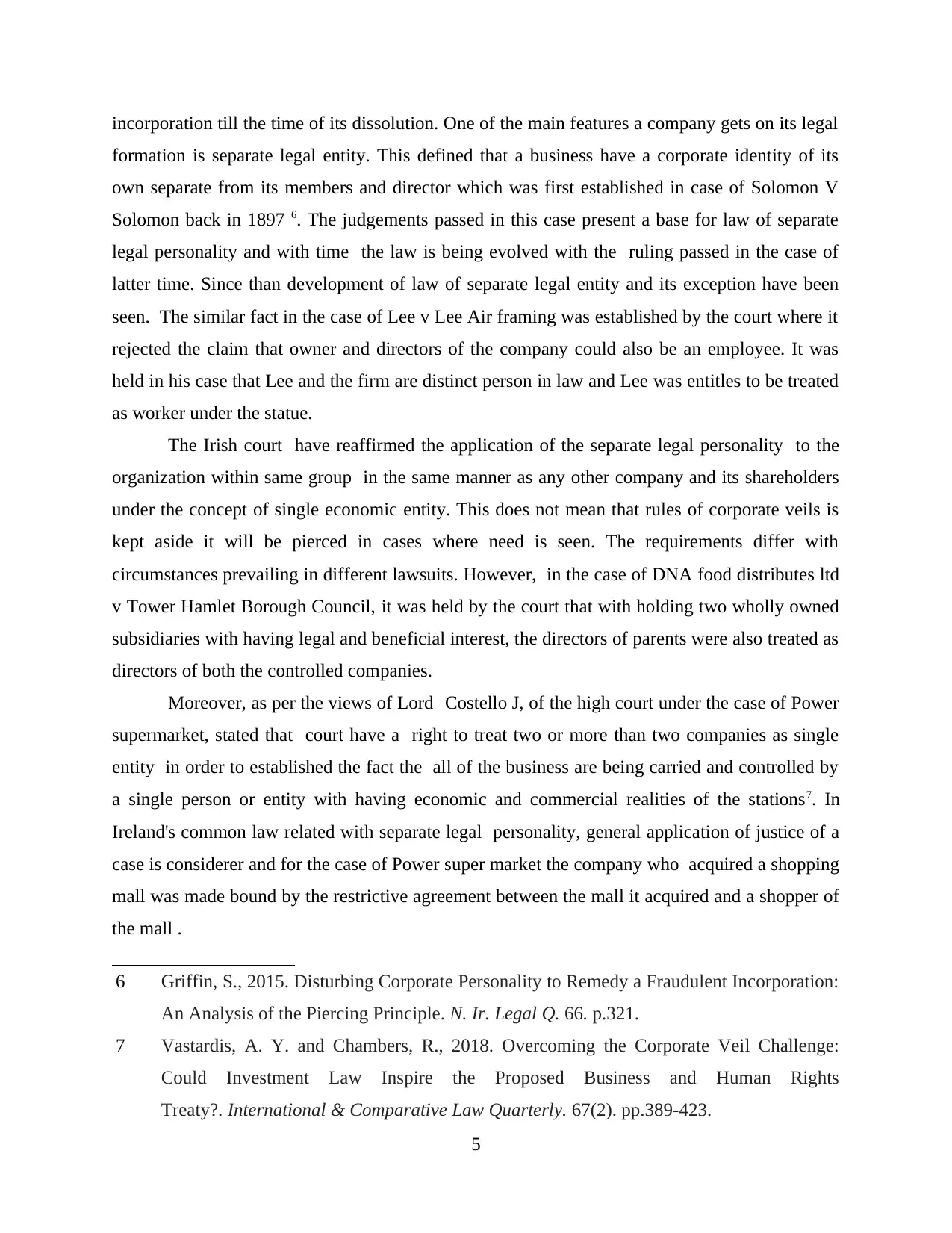
incorporation till the time of its dissolution. One of the main features a company gets on its legal
formation is separate legal entity. This defined that a business have a corporate identity of its
own separate from its members and director which was first established in case of Solomon V
Solomon back in 1897 6. The judgements passed in this case present a base for law of separate
legal personality and with time the law is being evolved with the ruling passed in the case of
latter time. Since than development of law of separate legal entity and its exception have been
seen. The similar fact in the case of Lee v Lee Air framing was established by the court where it
rejected the claim that owner and directors of the company could also be an employee. It was
held in his case that Lee and the firm are distinct person in law and Lee was entitles to be treated
as worker under the statue.
The Irish court have reaffirmed the application of the separate legal personality to the
organization within same group in the same manner as any other company and its shareholders
under the concept of single economic entity. This does not mean that rules of corporate veils is
kept aside it will be pierced in cases where need is seen. The requirements differ with
circumstances prevailing in different lawsuits. However, in the case of DNA food distributes ltd
v Tower Hamlet Borough Council, it was held by the court that with holding two wholly owned
subsidiaries with having legal and beneficial interest, the directors of parents were also treated as
directors of both the controlled companies.
Moreover, as per the views of Lord Costello J, of the high court under the case of Power
supermarket, stated that court have a right to treat two or more than two companies as single
entity in order to established the fact the all of the business are being carried and controlled by
a single person or entity with having economic and commercial realities of the stations7. In
Ireland's common law related with separate legal personality, general application of justice of a
case is considerer and for the case of Power super market the company who acquired a shopping
mall was made bound by the restrictive agreement between the mall it acquired and a shopper of
the mall .
6 Griffin, S., 2015. Disturbing Corporate Personality to Remedy a Fraudulent Incorporation:
An Analysis of the Piercing Principle. N. Ir. Legal Q. 66. p.321.
7 Vastardis, A. Y. and Chambers, R., 2018. Overcoming the Corporate Veil Challenge:
Could Investment Law Inspire the Proposed Business and Human Rights
Treaty?. International & Comparative Law Quarterly. 67(2). pp.389-423.
5
formation is separate legal entity. This defined that a business have a corporate identity of its
own separate from its members and director which was first established in case of Solomon V
Solomon back in 1897 6. The judgements passed in this case present a base for law of separate
legal personality and with time the law is being evolved with the ruling passed in the case of
latter time. Since than development of law of separate legal entity and its exception have been
seen. The similar fact in the case of Lee v Lee Air framing was established by the court where it
rejected the claim that owner and directors of the company could also be an employee. It was
held in his case that Lee and the firm are distinct person in law and Lee was entitles to be treated
as worker under the statue.
The Irish court have reaffirmed the application of the separate legal personality to the
organization within same group in the same manner as any other company and its shareholders
under the concept of single economic entity. This does not mean that rules of corporate veils is
kept aside it will be pierced in cases where need is seen. The requirements differ with
circumstances prevailing in different lawsuits. However, in the case of DNA food distributes ltd
v Tower Hamlet Borough Council, it was held by the court that with holding two wholly owned
subsidiaries with having legal and beneficial interest, the directors of parents were also treated as
directors of both the controlled companies.
Moreover, as per the views of Lord Costello J, of the high court under the case of Power
supermarket, stated that court have a right to treat two or more than two companies as single
entity in order to established the fact the all of the business are being carried and controlled by
a single person or entity with having economic and commercial realities of the stations7. In
Ireland's common law related with separate legal personality, general application of justice of a
case is considerer and for the case of Power super market the company who acquired a shopping
mall was made bound by the restrictive agreement between the mall it acquired and a shopper of
the mall .
6 Griffin, S., 2015. Disturbing Corporate Personality to Remedy a Fraudulent Incorporation:
An Analysis of the Piercing Principle. N. Ir. Legal Q. 66. p.321.
7 Vastardis, A. Y. and Chambers, R., 2018. Overcoming the Corporate Veil Challenge:
Could Investment Law Inspire the Proposed Business and Human Rights
Treaty?. International & Comparative Law Quarterly. 67(2). pp.389-423.
5
Paraphrase This Document
Need a fresh take? Get an instant paraphrase of this document with our AI Paraphraser
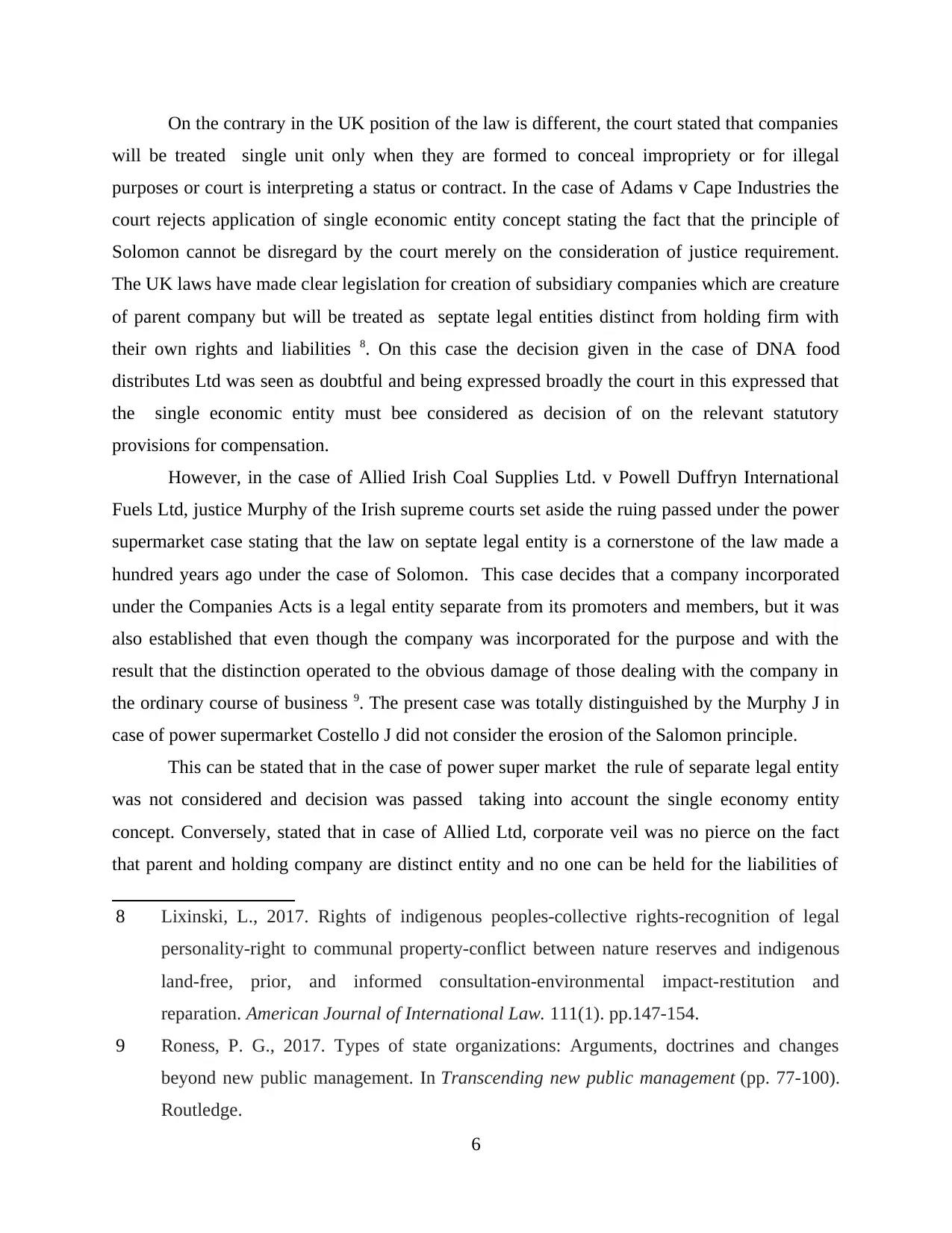
On the contrary in the UK position of the law is different, the court stated that companies
will be treated single unit only when they are formed to conceal impropriety or for illegal
purposes or court is interpreting a status or contract. In the case of Adams v Cape Industries the
court rejects application of single economic entity concept stating the fact that the principle of
Solomon cannot be disregard by the court merely on the consideration of justice requirement.
The UK laws have made clear legislation for creation of subsidiary companies which are creature
of parent company but will be treated as septate legal entities distinct from holding firm with
their own rights and liabilities 8. On this case the decision given in the case of DNA food
distributes Ltd was seen as doubtful and being expressed broadly the court in this expressed that
the single economic entity must bee considered as decision of on the relevant statutory
provisions for compensation.
However, in the case of Allied Irish Coal Supplies Ltd. v Powell Duffryn International
Fuels Ltd, justice Murphy of the Irish supreme courts set aside the ruing passed under the power
supermarket case stating that the law on septate legal entity is a cornerstone of the law made a
hundred years ago under the case of Solomon. This case decides that a company incorporated
under the Companies Acts is a legal entity separate from its promoters and members, but it was
also established that even though the company was incorporated for the purpose and with the
result that the distinction operated to the obvious damage of those dealing with the company in
the ordinary course of business 9. The present case was totally distinguished by the Murphy J in
case of power supermarket Costello J did not consider the erosion of the Salomon principle.
This can be stated that in the case of power super market the rule of separate legal entity
was not considered and decision was passed taking into account the single economy entity
concept. Conversely, stated that in case of Allied Ltd, corporate veil was no pierce on the fact
that parent and holding company are distinct entity and no one can be held for the liabilities of
8 Lixinski, L., 2017. Rights of indigenous peoples-collective rights-recognition of legal
personality-right to communal property-conflict between nature reserves and indigenous
land-free, prior, and informed consultation-environmental impact-restitution and
reparation. American Journal of International Law. 111(1). pp.147-154.
9 Roness, P. G., 2017. Types of state organizations: Arguments, doctrines and changes
beyond new public management. In Transcending new public management (pp. 77-100).
Routledge.
6
will be treated single unit only when they are formed to conceal impropriety or for illegal
purposes or court is interpreting a status or contract. In the case of Adams v Cape Industries the
court rejects application of single economic entity concept stating the fact that the principle of
Solomon cannot be disregard by the court merely on the consideration of justice requirement.
The UK laws have made clear legislation for creation of subsidiary companies which are creature
of parent company but will be treated as septate legal entities distinct from holding firm with
their own rights and liabilities 8. On this case the decision given in the case of DNA food
distributes Ltd was seen as doubtful and being expressed broadly the court in this expressed that
the single economic entity must bee considered as decision of on the relevant statutory
provisions for compensation.
However, in the case of Allied Irish Coal Supplies Ltd. v Powell Duffryn International
Fuels Ltd, justice Murphy of the Irish supreme courts set aside the ruing passed under the power
supermarket case stating that the law on septate legal entity is a cornerstone of the law made a
hundred years ago under the case of Solomon. This case decides that a company incorporated
under the Companies Acts is a legal entity separate from its promoters and members, but it was
also established that even though the company was incorporated for the purpose and with the
result that the distinction operated to the obvious damage of those dealing with the company in
the ordinary course of business 9. The present case was totally distinguished by the Murphy J in
case of power supermarket Costello J did not consider the erosion of the Salomon principle.
This can be stated that in the case of power super market the rule of separate legal entity
was not considered and decision was passed taking into account the single economy entity
concept. Conversely, stated that in case of Allied Ltd, corporate veil was no pierce on the fact
that parent and holding company are distinct entity and no one can be held for the liabilities of
8 Lixinski, L., 2017. Rights of indigenous peoples-collective rights-recognition of legal
personality-right to communal property-conflict between nature reserves and indigenous
land-free, prior, and informed consultation-environmental impact-restitution and
reparation. American Journal of International Law. 111(1). pp.147-154.
9 Roness, P. G., 2017. Types of state organizations: Arguments, doctrines and changes
beyond new public management. In Transcending new public management (pp. 77-100).
Routledge.
6
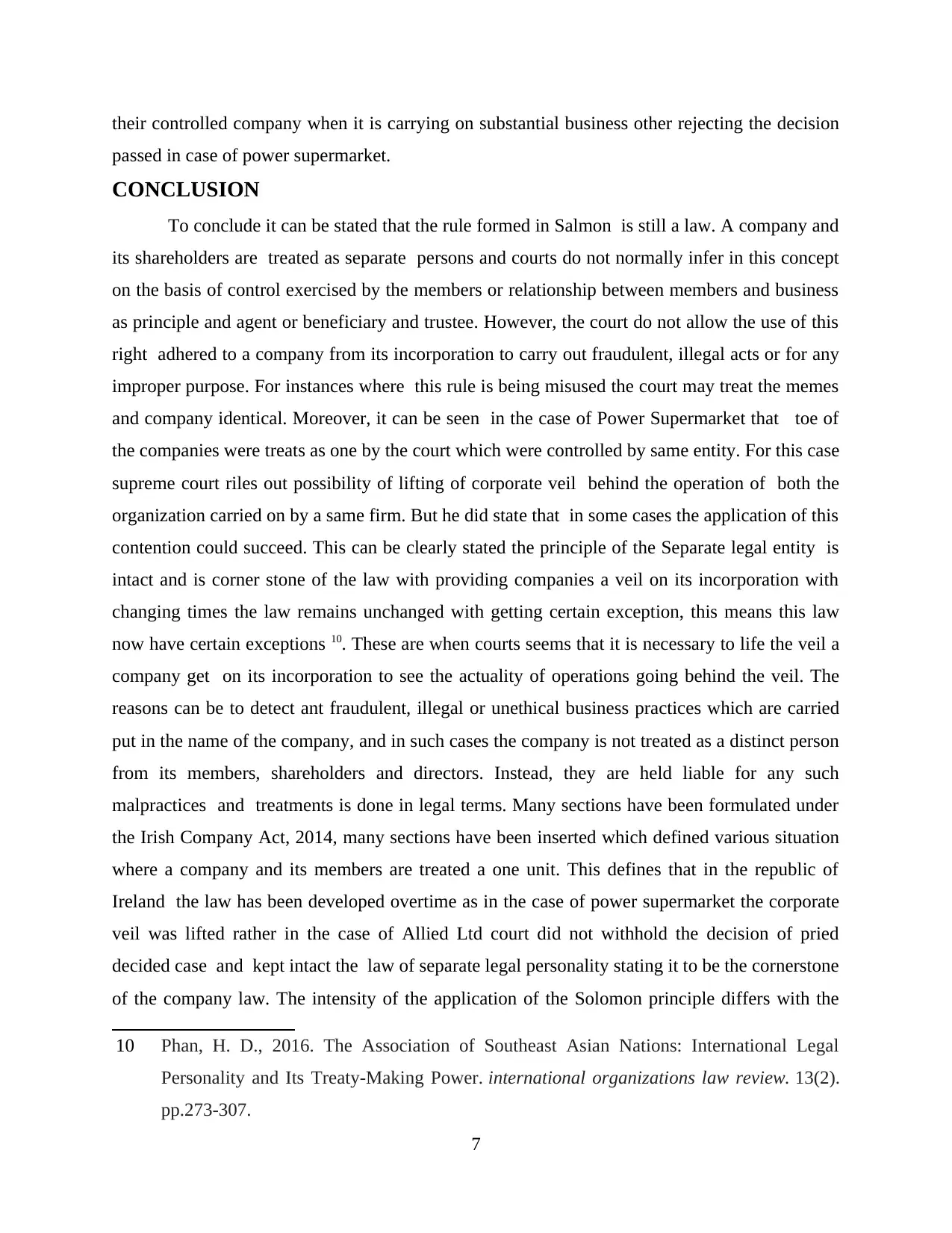
their controlled company when it is carrying on substantial business other rejecting the decision
passed in case of power supermarket.
CONCLUSION
To conclude it can be stated that the rule formed in Salmon is still a law. A company and
its shareholders are treated as separate persons and courts do not normally infer in this concept
on the basis of control exercised by the members or relationship between members and business
as principle and agent or beneficiary and trustee. However, the court do not allow the use of this
right adhered to a company from its incorporation to carry out fraudulent, illegal acts or for any
improper purpose. For instances where this rule is being misused the court may treat the memes
and company identical. Moreover, it can be seen in the case of Power Supermarket that toe of
the companies were treats as one by the court which were controlled by same entity. For this case
supreme court riles out possibility of lifting of corporate veil behind the operation of both the
organization carried on by a same firm. But he did state that in some cases the application of this
contention could succeed. This can be clearly stated the principle of the Separate legal entity is
intact and is corner stone of the law with providing companies a veil on its incorporation with
changing times the law remains unchanged with getting certain exception, this means this law
now have certain exceptions 10. These are when courts seems that it is necessary to life the veil a
company get on its incorporation to see the actuality of operations going behind the veil. The
reasons can be to detect ant fraudulent, illegal or unethical business practices which are carried
put in the name of the company, and in such cases the company is not treated as a distinct person
from its members, shareholders and directors. Instead, they are held liable for any such
malpractices and treatments is done in legal terms. Many sections have been formulated under
the Irish Company Act, 2014, many sections have been inserted which defined various situation
where a company and its members are treated a one unit. This defines that in the republic of
Ireland the law has been developed overtime as in the case of power supermarket the corporate
veil was lifted rather in the case of Allied Ltd court did not withhold the decision of pried
decided case and kept intact the law of separate legal personality stating it to be the cornerstone
of the company law. The intensity of the application of the Solomon principle differs with the
10 Phan, H. D., 2016. The Association of Southeast Asian Nations: International Legal
Personality and Its Treaty-Making Power. international organizations law review. 13(2).
pp.273-307.
7
passed in case of power supermarket.
CONCLUSION
To conclude it can be stated that the rule formed in Salmon is still a law. A company and
its shareholders are treated as separate persons and courts do not normally infer in this concept
on the basis of control exercised by the members or relationship between members and business
as principle and agent or beneficiary and trustee. However, the court do not allow the use of this
right adhered to a company from its incorporation to carry out fraudulent, illegal acts or for any
improper purpose. For instances where this rule is being misused the court may treat the memes
and company identical. Moreover, it can be seen in the case of Power Supermarket that toe of
the companies were treats as one by the court which were controlled by same entity. For this case
supreme court riles out possibility of lifting of corporate veil behind the operation of both the
organization carried on by a same firm. But he did state that in some cases the application of this
contention could succeed. This can be clearly stated the principle of the Separate legal entity is
intact and is corner stone of the law with providing companies a veil on its incorporation with
changing times the law remains unchanged with getting certain exception, this means this law
now have certain exceptions 10. These are when courts seems that it is necessary to life the veil a
company get on its incorporation to see the actuality of operations going behind the veil. The
reasons can be to detect ant fraudulent, illegal or unethical business practices which are carried
put in the name of the company, and in such cases the company is not treated as a distinct person
from its members, shareholders and directors. Instead, they are held liable for any such
malpractices and treatments is done in legal terms. Many sections have been formulated under
the Irish Company Act, 2014, many sections have been inserted which defined various situation
where a company and its members are treated a one unit. This defines that in the republic of
Ireland the law has been developed overtime as in the case of power supermarket the corporate
veil was lifted rather in the case of Allied Ltd court did not withhold the decision of pried
decided case and kept intact the law of separate legal personality stating it to be the cornerstone
of the company law. The intensity of the application of the Solomon principle differs with the
10 Phan, H. D., 2016. The Association of Southeast Asian Nations: International Legal
Personality and Its Treaty-Making Power. international organizations law review. 13(2).
pp.273-307.
7
⊘ This is a preview!⊘
Do you want full access?
Subscribe today to unlock all pages.

Trusted by 1+ million students worldwide

facts and circumstances presented in a case but the fact of distinct personality of a corporation
can not be denied any situation.
8
can not be denied any situation.
8
Paraphrase This Document
Need a fresh take? Get an instant paraphrase of this document with our AI Paraphraser
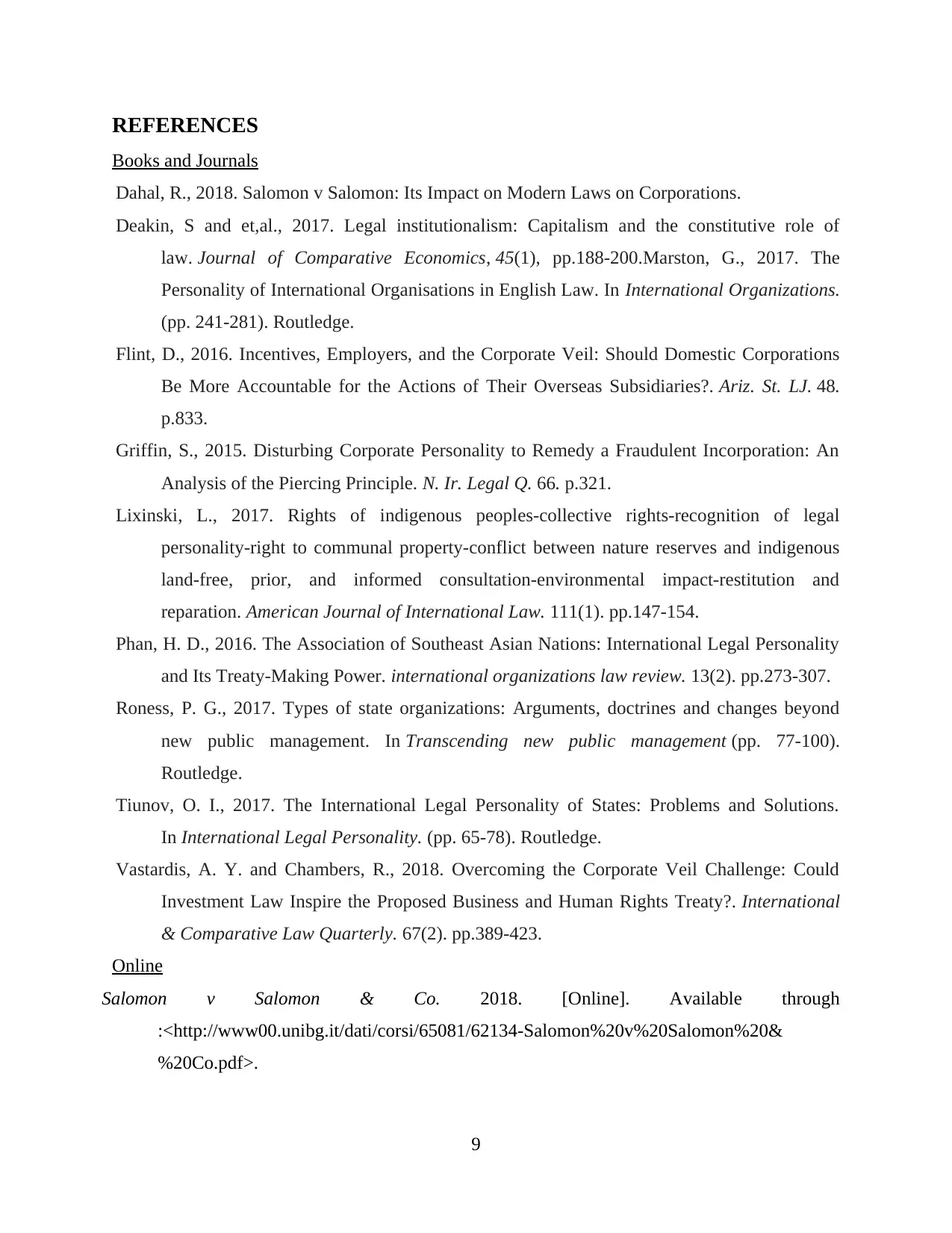
REFERENCES
Books and Journals
Dahal, R., 2018. Salomon v Salomon: Its Impact on Modern Laws on Corporations.
Deakin, S and et,al., 2017. Legal institutionalism: Capitalism and the constitutive role of
law. Journal of Comparative Economics, 45(1), pp.188-200.Marston, G., 2017. The
Personality of International Organisations in English Law. In International Organizations.
(pp. 241-281). Routledge.
Flint, D., 2016. Incentives, Employers, and the Corporate Veil: Should Domestic Corporations
Be More Accountable for the Actions of Their Overseas Subsidiaries?. Ariz. St. LJ. 48.
p.833.
Griffin, S., 2015. Disturbing Corporate Personality to Remedy a Fraudulent Incorporation: An
Analysis of the Piercing Principle. N. Ir. Legal Q. 66. p.321.
Lixinski, L., 2017. Rights of indigenous peoples-collective rights-recognition of legal
personality-right to communal property-conflict between nature reserves and indigenous
land-free, prior, and informed consultation-environmental impact-restitution and
reparation. American Journal of International Law. 111(1). pp.147-154.
Phan, H. D., 2016. The Association of Southeast Asian Nations: International Legal Personality
and Its Treaty-Making Power. international organizations law review. 13(2). pp.273-307.
Roness, P. G., 2017. Types of state organizations: Arguments, doctrines and changes beyond
new public management. In Transcending new public management (pp. 77-100).
Routledge.
Tiunov, O. I., 2017. The International Legal Personality of States: Problems and Solutions.
In International Legal Personality. (pp. 65-78). Routledge.
Vastardis, A. Y. and Chambers, R., 2018. Overcoming the Corporate Veil Challenge: Could
Investment Law Inspire the Proposed Business and Human Rights Treaty?. International
& Comparative Law Quarterly. 67(2). pp.389-423.
Online
Salomon v Salomon & Co. 2018. [Online]. Available through
:<http://www00.unibg.it/dati/corsi/65081/62134-Salomon%20v%20Salomon%20&
%20Co.pdf>.
9
Books and Journals
Dahal, R., 2018. Salomon v Salomon: Its Impact on Modern Laws on Corporations.
Deakin, S and et,al., 2017. Legal institutionalism: Capitalism and the constitutive role of
law. Journal of Comparative Economics, 45(1), pp.188-200.Marston, G., 2017. The
Personality of International Organisations in English Law. In International Organizations.
(pp. 241-281). Routledge.
Flint, D., 2016. Incentives, Employers, and the Corporate Veil: Should Domestic Corporations
Be More Accountable for the Actions of Their Overseas Subsidiaries?. Ariz. St. LJ. 48.
p.833.
Griffin, S., 2015. Disturbing Corporate Personality to Remedy a Fraudulent Incorporation: An
Analysis of the Piercing Principle. N. Ir. Legal Q. 66. p.321.
Lixinski, L., 2017. Rights of indigenous peoples-collective rights-recognition of legal
personality-right to communal property-conflict between nature reserves and indigenous
land-free, prior, and informed consultation-environmental impact-restitution and
reparation. American Journal of International Law. 111(1). pp.147-154.
Phan, H. D., 2016. The Association of Southeast Asian Nations: International Legal Personality
and Its Treaty-Making Power. international organizations law review. 13(2). pp.273-307.
Roness, P. G., 2017. Types of state organizations: Arguments, doctrines and changes beyond
new public management. In Transcending new public management (pp. 77-100).
Routledge.
Tiunov, O. I., 2017. The International Legal Personality of States: Problems and Solutions.
In International Legal Personality. (pp. 65-78). Routledge.
Vastardis, A. Y. and Chambers, R., 2018. Overcoming the Corporate Veil Challenge: Could
Investment Law Inspire the Proposed Business and Human Rights Treaty?. International
& Comparative Law Quarterly. 67(2). pp.389-423.
Online
Salomon v Salomon & Co. 2018. [Online]. Available through
:<http://www00.unibg.it/dati/corsi/65081/62134-Salomon%20v%20Salomon%20&
%20Co.pdf>.
9
1 out of 11
Related Documents
Your All-in-One AI-Powered Toolkit for Academic Success.
+13062052269
info@desklib.com
Available 24*7 on WhatsApp / Email
![[object Object]](/_next/static/media/star-bottom.7253800d.svg)
Unlock your academic potential
Copyright © 2020–2026 A2Z Services. All Rights Reserved. Developed and managed by ZUCOL.





